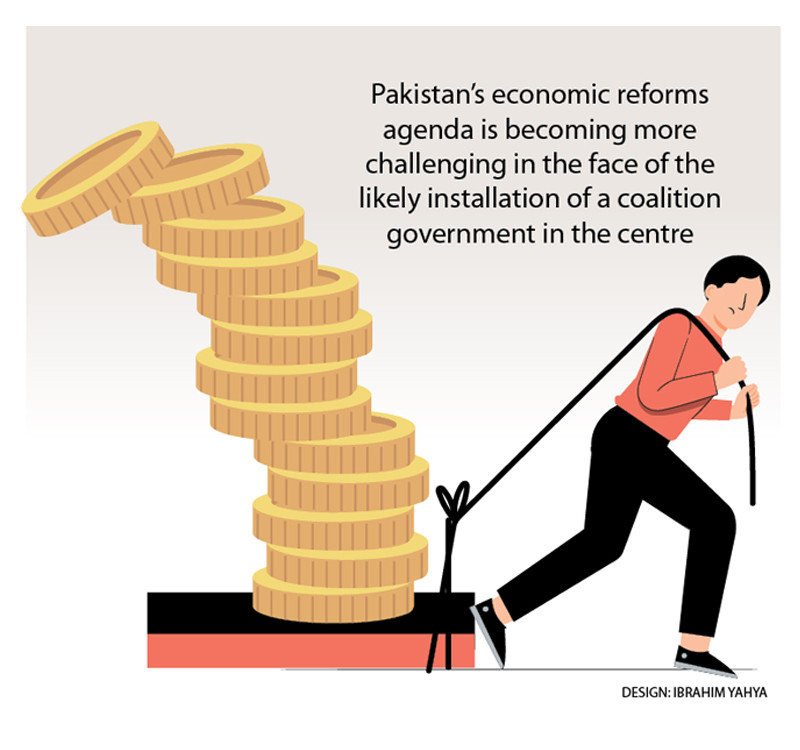
design: Ibrahim Yahya
KARACHI:
Pakistan’s long overdue economic reforms and privatisation programme may become more challenging in the face of the potential installation of a coalition government as no political party has won a clear majority in Thursday’s general elections.
The new administration is expected to opt for old solutions that have already been tested in the past 30 to 40 years. In one of the easiest measures, it will increase energy prices instead of undertaking politically tough energy reforms. Consequently, the inflation rate will continue to remain elevated. According to experts, Pakistani rupee is expected to stay stable against the US dollar and other major currencies in the short run. However, the stock market and Eurobonds may come under pressure in the backdrop of heightened political uncertainty as it is unclear who will form the next government.
Talking to The Express Tribune, independent analyst Adnan Agar was of the view that the Pakistan Muslim League-Nawaz (PML-N) had an economic team unlike Pakistan Tehreek-e-Insaf (PTI) and Pakistan Peoples Party (PPP).
However, the PML-N’s earlier finance minister Ishaq Dar had a “hostile relationship” with the International Monetary Fund (IMF), he recalled, adding that Dar would continue to pursue his old policies of keeping the rupee-dollar parity under control and flouting conditions of a new loan programme.
“Whoever forms the government will approach the IMF for entering into a new programme after getting the last tranche of $1.1 billion under the ongoing standby arrangement to achieve economic stability and growth and continue to repay foreign debt without any interruption,” he said.
Agar emphasised the dire need for Pakistan to adopt tax reforms like taxing the agriculture and real estate sectors to increase revenue collection and say goodbye to the IMF forever. However, he raised a question “how can the elite (in the government) tax themselves”.
They would further increase electricity and gas prices to address the circular debt issue instead of tackling line losses and energy theft. They may continue to tax businesses already reeling from high levies instead of going after the rich, said Agar, who is also Director Research at AA Gold Commodities.
Chase Securities Director Research Yousuf M Farooq said Pakistan could not afford another political uncertainty at a crucial time when it needed a strong leadership to get the economy out of crisis.
“Pakistan’s stock market and Eurobonds will remain volatile if political temperatures do not come down by Sunday night,” he said.
He pointed out that the PPP had a history of supporting economic reforms and it would continue to do so in future as well. However, PPP Chairman Bilawal Bhutto-Zardari has openly opposed privatisation of state-owned entities, he said, but added that the privatisation programme may remain on track under the Special Investment Facilitation Council (SIFC) platform.
Read
Structural reforms inevitable to cope with economic challenges: PM
Farooq projected that inflation would decelerate from February onwards, providing room for a reduction in the central bank’s policy rate, which would gradually prop up business and economic activities.
Treasury firm Tresmark said in a commentary that while the business community was anxious about the split mandate and political uncertainty, “currency traders see the rupee remaining range bound in the next 15 days”.
“As forward premiums are attractive, we will also see more forward selling by exporters, but all in the 15 to 60-day tenors.”
With elections now over, the market is expecting more bilateral and multilateral financing to trickle in and the third IMF review to conclude with loan tranche disbursement after some potential hiccups.
“Having said this, (rupee) upside is also limited and any appreciation above the 276 level will start hurting country’s exports,” Tresmark said.
Talking to Bloomberg TV, former SBP governor Reza Baqir said the other day that securing a new IMF loan programme and controlling inflation would remain the two key challenges for the new government.
Pakistan has significant economic challenges, one of them is how sustainable is its debt. Pakistan does not have access to capital markets (to raise new financing through Eurobonds) and one of the key priorities for any new government is going to be how to restore confidence in its economy, he said.
“I think the number one challenge is going to be how to put the economy on a sustainable footing and how to manage its relationship with the IMF,” Baqir said.
“The first goal is going to be how does Pakistan make a more equitable tax system? How does it bring into the tax net people and privileged classes, who have avoided taxes instead of continuing to squeeze those in the middle class and the salary-earning people? How Pakistan can broaden its base?”